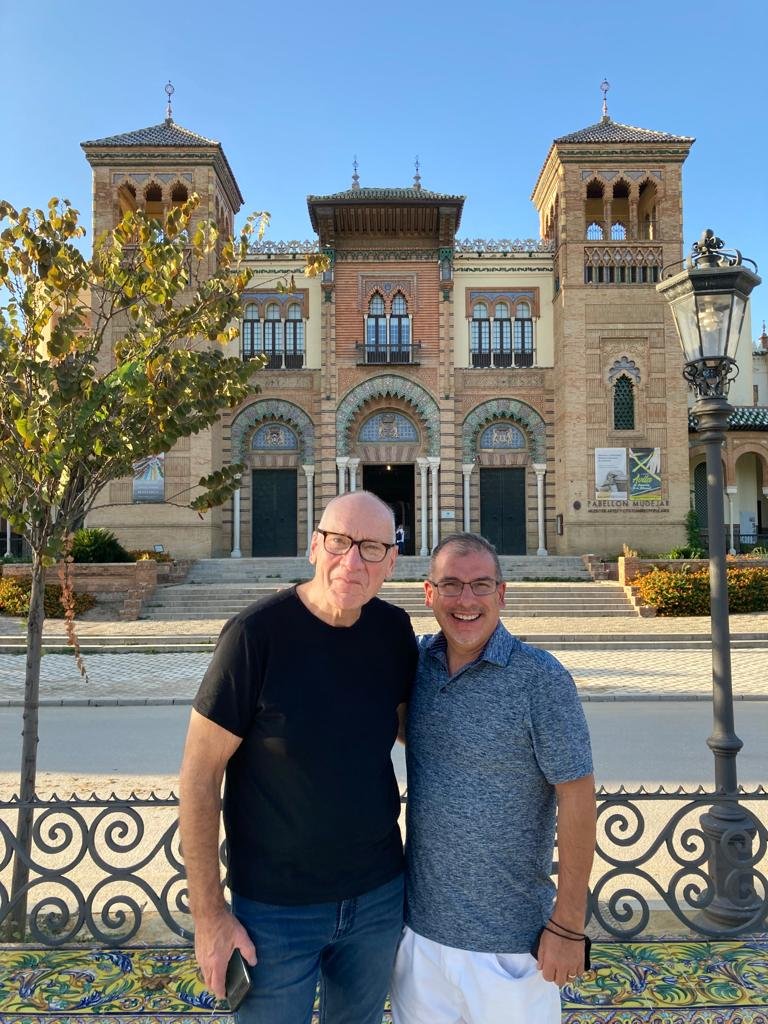New England and European Baptists Share a Mission Partnership with IMB
A team from the BCNE meets with SBC church planters in Ireland
“New England has a similar cultural context to Europe” and a developing partnership with like-minded Baptists there, initially with churches in Ireland, Portugal, Scotland, Spain, and Wales. Both regions experience a “post-Christian environment and a postmodern mentality” that shapes their approaches to ministry and missions, explained Sam Taylor, BCNE’s Global Missions Mobilizer and the former Boston Area Regional Coordinator.
He was discussing the tripartite ministry that the Baptist Churches of New England (BCNE) commenced in March 2021 with the International Mission Board (IMB) and the International Baptist Convention (IBC) when BCNE Executive Director Terry Dorsett led five New England pastors and mission leaders on a vision tour to Madrid.
Taylor added that these post-Christian cultures, although similar, are “much more advanced in Europe than in New England.” BCNE pastors “will understand the European pastors better than pastors in the [American] Bible Belt would, and our ministry strategies would probably be better [than theirs] for that context,” he noted with reference to relational evangelism approaches that earn credibility and develop friendships before the gospel is discussed.
First, let’s consider the terminology and with it a reason for the partnership with Baptists in Europe. The term “post-Christianity,” the stepchild of postmodernism, is commonly defined as “the situation in which Christianity is no longer the dominant civil religion of a society but has gradually assumed values, culture, and worldviews that are not necessarily Christian.”
“The problem with that term, post-Christian, is that it implies that Christianity is somehow over. It is not. In fact, the various alternatives throw the superiority—and the truth—of Christianity in high relief,” wrote Gene Edward Veith Jr. in Post-Christian: A Guide to Contemporary Thought and Culture (2020). “Our contemporary secularist thought and culture are not nearly as formidable as they may seem. Post-Christian ways of thinking and living are running into dead ends and fatal contradictions,” he observed.
Sam Taylor with IMB missionary in Seville, Spain
New England pastors, Taylor said, expressed their “enormous enthusiasm” and indicated a “strong response” for the BCNE-IMB-IBC partnership—and then the COVID-19 pandemic “brought everything to a screeching halt.” In the summer of 2023, “the momentum has begun to rebuild, and we are seeing engagement from churches from all across New England.”
Daniel Frantz, an IMB representative with knowledge of the church situation in Europe, agreed with Taylor about the current cultural climate in Europe and reflected on “great moves of God”—in European history including the Protestant Reformation led by Martin Luther and others, and in American history including the First Great Awakening led by Jonathan Edwards and others. He noted that nowadays many church buildings have closed their doors for worship and have become tourist attractions or have reopened as bookstores or restaurants.
“You see a history of Christianity there, but you do not see people with ready access to the gospel. In the United States, we are maybe a few decades from being in the same place that Europe is in that regard,” Frantz [an American who prefers a pseudonym for security reasons] stated.
Taylor, who works from his home in New Hampshire, described the nascent partnership as an effort to “strengthen, encourage, and equip” the indigenous churches of Europe and to undergird the “local stewardship of the missionary task.”
“European Baptists have a rich history and I believe that New England Baptists can learn a lot from them. It is our hope that as we learn from them, we might also be able to help them accomplish their vision of reaching their friends and neighbors for Christ,” commented Dorsett, who formerly led Baptist ministries in Vermont and was a pastor-church planter there.
“The BCNE counts former New England pastors serving as IMB workers in England, Scotland, and Poland. Lord willing, the number of New England Baptists who move to Europe to work alongside our brothers and sisters there will increase over the next few years,” he added.
“Certainly, the plan is not to go there and do the work in the place of the local church. Our aim is always partnership,” the IMB representative said. “The core missionary task is partnership. We are there to help, assist, and encourage the local church to do the work. We will have succeeded when we leave, when the local church has taken up the task and is running with it. That is always the end goal.”
“The presence of the gospel there in the past does not necessarily mean that the average person today has immediate access to the gospel. The born-again, Bible-believing population in Europe is far less than one percent in most countries. There aren’t many evangelicals in those countries today,” he noted.
In a 2017 report entitled “Why New England is the New American Missional Frontier,” published by The Gospel Coalition, the author concluded that “If there is an unreached people group in the United States, it is New Englanders. A 2009 Gallup poll placed the six states of New England in the top ten least religious states in the nation. While the Bible Belt is approaching a completely unchurched generation, New England is already there.”
“New Englanders,” The Gospel Coalition author observed, “have little desire for anything to do with Christianity or church but even those who have it have little opportunity to explore it. While the landscape of New England is dotted with little church buildings, some quaint and some beautiful, more and more of these buildings now house liberal, practically Unitarian congregations, if they house church gatherings at all. And where churches are evangelical, the evangel has not yet captured the hearts of many congregations.”
The Barna Group’s “Most Post-Christian Cities in America” report in 2019 shows that “the most post-Christian city in America is Springfield-Holyoke, MA (66%)” [Springfield is just twenty miles south of where Edwards preached in the 1700s], followed closely by the New England “cities” of Portland-Auburn (ME), Providence (RI)-New Bedford (MA), Burlington (VT), and Boston (MA)-Manchester (NH).
The picture is much the same in Europe. A 2018 Pew Research Center survey of religious beliefs and practices entitled “Being Christian in Western Europe” concluded that “Western Europe, where Protestant Christianity originated and Catholicism has been based for most of its history, has become one of the world’s most secular regions.”
“Although the vast majority of adults [in Western Europe] say they were baptized, today many do not describe themselves as Christians. Some say they gradually drifted away from religion, stopped believing in religious teachings, or were alienated by scandals or church positions on social issues,” the Pew report added.
Tim Faulker of the International Baptist Convention in Frankfurt, Germany
Tim Faulkner, General Secretary of the International Baptist Convention, Frankfurt, Germany, who anticipates strong connections with BCNE and IMB, wrote in an email of the partnership: “International Baptists ministering throughout Europe in the English language often struggle to find like-minded fellowship in the Baptist Unions of their host countries. Local denominational leaders appreciate counting our new church plants while at the same time lamenting that their churches are dying.”
“IBC pastors, who will meet for their annual meeting October 23–25 in Stuttgart, often feel like they are alone in faithfully representing Christ in their city. At the same time this experience strengthens their resolve to reach Europe once again with the gospel,” added Faulkner, who is from a small town in upstate New York and who, with his wife and children, formerly was a church planter in Naples, Italy, with Colorado-based WorldVenture, and then was named pastor of Il Faro International Baptist Church, Castel Volturno, Italy.
While New Englanders visit Europe for short-term service, Europeans are coming to New England; it’s a two-way partnership. “That is certainly how partnerships are built and that has already occurred to some extent. Pastoral exchanges and vision tours for leaders are part of the evolving partnership,” observed Taylor.
Even post-pandemic, developing a partnership is a complex and lengthy process. “It’s helpful to think of these partnerships like a jumbo jet that needs a lot of runway before it becomes airborne. Global partnerships are that way,” he noted. “There’s a lot of time spent developing relationships and making plans before engagement occurs. In 2024 we are praying that we will see an explosion of engagement.”
Why not go somewhere that has rarely heard the gospel, to an unreached people group? Why send personnel to and invest funds from New England churches in Europe when we can strengthen ministries and churches here at home with the limited resources with which we have been blessed?
Baptists have been asking the same questions for many years. In the October 1939 issue of The Commission: A Baptist World Journal (p. 333), published by the then-Foreign Mission Board, W. O. Wilson, an American who served as general secretary of the Baptist World Alliance, was asked whether or not Baptist funds would be better spent to evangelize the people of Africa, Asia, and Latin America.
He wrote in the essay—“What About Europe”—that “We already have work there. Unless the enterprise is so strong that we are no longer needed, we must go on. Europe has strategic value. If Europe were thoroughly Christian, it would be far easier to win other parts of the world for Christ.”
Besides, the “Great Commissions” from Jesus—including Matt 28:18-20 and Acts 1:8—compel such international ministry.
—A Massachusetts native and a New England Baptist since 1970, Dan Nicholas is the BCNE managing editor.



